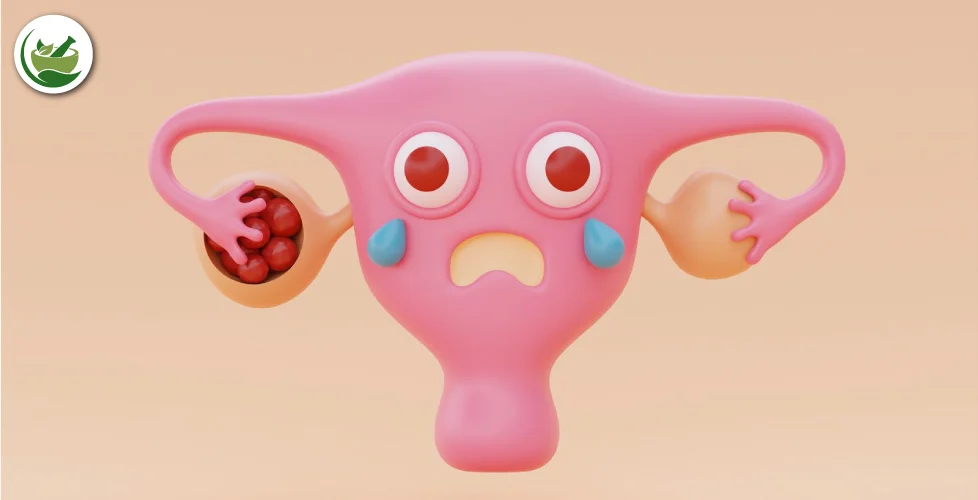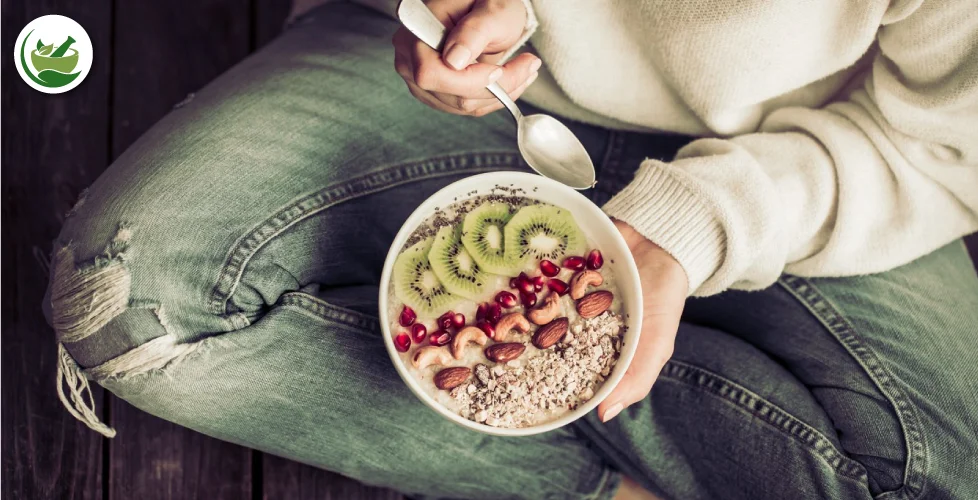
Polycystic Ovary Syndrome (PCOS) is a prevalent endocrine disorder affecting approximately 1 in 10 women of childbearing age. This condition is characterized by a combination of symptoms such as irregular menstrual cycles, excessive hair growth, acne, and obesity, which can significantly impact a woman’s quality of life.
While the exact cause of PCOS remains unclear, it’s understood that insulin resistance, inflammation, and hormonal imbalances play crucial roles in its development and progression. Consequently, dietary and lifestyle modifications are often recommended as part of the management strategy for PCOS.
Among various natural remedies and superfoods, chia seeds have been highlighted for their potential benefits for those suffering from PCOS.
This blog post delves into how incorporating chia seeds into your diet could offer relief and support in managing PCOS symptoms.
What are chia seeds?
Chia seeds are small, yet mighty, seeds derived from the Salvia hispanica plant, originally grown in Mexico and Guatemala. They have been consumed for centuries, valued for their impressive nutritional profile and medicinal properties.
Rich in omega-3 fatty acids, fiber, antioxidants, and essential minerals such as magnesium, calcium, and phosphorus, chia seeds are considered a superfood.
Their ability to absorb water and form a gel-like consistency makes them a versatile ingredient in the kitchen, easily added to a variety of dishes for a nutritional boost.
Nutritional value of chia seeds
The nutritional value of chia seeds is remarkable, boasting a diverse range of essential nutrients vital for overall health.
Essential Fats
Chia seeds are abundant in Omega-3 fatty acids and polyunsaturated fats, which are crucial for promoting heart and brain health.
Carbohydrates
Serving as a fundamental energy source, carbohydrates found in chia seeds are integral to a balanced diet.
Dietary Fiber
Chia seeds are high in fiber, supporting digestive health and aiding in weight management.
Protein
They offer a substantial amount of protein, essential for muscle repair and growth.
- Vitamins:
Chia seeds are rich in various vitamins, including A, B, K, E, and D, each contributing uniquely to overall health support.
- Minerals:
Chia seeds are a plentiful source of calcium, potassium, magnesium, and phosphorus, crucial for maintaining bone health, supporting muscle function, and more.
- Antioxidants:
Loaded with antioxidants such as carotenoids, phytosterols, and polyphenolic compounds, chia seeds combat oxidative stress and help reduce inflammation.
Chia Seeds and PCOS: The Connection

The link between chia seeds and PCOS management lies in the seeds’ nutritional composition, which addresses several underlying factors of the syndrome. Insulin resistance, a common issue for those with PCOS, can lead to elevated blood sugar levels and weight gain, exacerbating the condition.
Chia seeds, with their high fiber content, can help slow the absorption of sugar in the bloodstream, aiding in blood sugar regulation.
Furthermore, the anti-inflammatory properties of omega-3 fatty acids found in chia seeds can help mitigate chronic inflammation associated with PCOS. This combination of benefits makes chia seeds a potential natural ally in managing PCOS symptoms.
Key Benefits of Chia Seeds for PCOS
Balancing blood sugar levels
One of the hallmark challenges of PCOS is managing insulin resistance and blood sugar levels. The high fiber content in chia seeds plays a pivotal role in this aspect. By slowing down the conversion of carbohydrates into sugar, chia seeds help maintain more stable blood sugar levels, reducing the risk of insulin spikes and crashes. This stability is crucial for those with PCOS, as it can help manage cravings, improve energy levels, and potentially reduce the risk of developing type 2 diabetes.
Supporting regular menstrual cycles
A frequent challenge for individuals with PCOS is managing irregular menstrual cycles. Incorporating chia seeds into your diet may offer a natural approach to fostering more consistent cycles through enhanced hormonal equilibrium.
The substantial fiber found in chia seeds plays a pivotal role in moderating blood glucose levels. This stabilization can contribute significantly to the regularity of menstrual cycles, as fluctuations in blood sugar are linked to hormonal imbalances that can disrupt menstruation.
Moreover, the omega-3 fatty acids abundant in chia seeds are known for their anti-inflammatory properties. These beneficial fats can aid in diminishing inflammation around the reproductive organs, thereby promoting healthier and more predictable menstrual cycles.
Enhancing Fertility
For women with PCOS aiming to boost their fertility, incorporating chia seeds into their diet can offer significant benefits. The omega-3 fatty acids found in chia seeds are instrumental in enhancing egg quality and fostering a conducive environment for reproduction.
Heart Well-being
Chia seeds are an excellent source of omega-3 fatty acids, known for their role in enhancing heart health. Additionally, they are rich in antioxidants, potentially aiding in the reduction of heart disease risk.
Support weight management!
Fiber is a crucial component of a healthy diet, especially for those managing PCOS. It aids in digestion, helps regulate blood sugar levels, and can assist in achieving a healthy weight. Chia seeds are an outstanding source of fiber, with a single ounce (about 28 grams) providing 11 grams of dietary fiber. This high fiber content can promote satiety, reduce appetite, and support weight management efforts, all of which are beneficial for women with PCOS.
Reduce oxidative stress!
Chia seeds contain antioxidants, which combat oxidative stress and might lower the risk of chronic diseases. Oxidative stress links to the development and progression of PCOS. By incorporating antioxidant-rich foods like chia seeds into your diet, you can help protect your body’s cells from damage and support overall health and wellness.
How to Add Chia Seeds to Your Diet
Adding chia seeds to your diet is simple and can be quite delicious. They can be sprinkled over salads, you can also add chia seeds in smoothies, or used as a thickener in recipes.
For a quick and nutritious start to your day, try soaking chia seeds in almond milk overnight to make a pudding-like breakfast. Top with fresh berries and a drizzle of honey for extra flavor.
Alternatively, mix chia seeds into yogurt, oatmeal, or homemade muffins to boost their nutritional profile.
Dietary Advice
Best Chia Seeds for PCOS Management
When it comes to choosing chia seeds for those with PCOS, no one kind jumps out as the best. Both black and white chia seeds have similar nutritional advantages and are equally useful in a variety of culinary uses.
The best time to consume chia seeds?
The best time to integrate chia seeds into your diet is not limited to a single time of day. Chia seeds’ versatility allows them to be a nutritious complement to your meals anytime you choose, ensuring you get all their health benefits.
Chia seeds are quite versatile, since they may be consumed raw, incorporated into recipes, or soaked in liquids. Experiment with several recipes to see what fits your taste and lifestyle.
Some people prefer chia seeds as a snack, such as in chia pudding, or as a topping on cereals and salads. Others may like to put them into smoothies or porridge for an added nutritious boost.
Potential Side Effects of Chia Seeds
Chia seeds, while widely recognized for their health benefits and generally safe for consumption, can lead to adverse reactions in certain individuals. Below, we outline some potential side effects associated with chia seed intake:
- Digestive Discomfort
Due to their high fiber content, consuming chia seeds in excessive amounts might lead to digestive discomfort, including bloating, gas, or diarrhea. It’s important to moderate your intake and increase it gradually to allow your body to adjust.
- Allergic Reactions
On rare occasions, individuals may exhibit an allergic response to chia seeds, manifested through symptoms like itching, swelling, or difficulty breathing. If you suspect an allergy to chia seeds, it’s crucial to discontinue use immediately and consult a healthcare professional.
- Medication Interference
Chia seeds have the potential to interact with certain medications. This includes blood thinners and medications affecting blood pressure. If you are on any prescription drugs, discussing the incorporation of chia seeds into your diet with a healthcare provider is advisable to avoid any adverse effects.
Considerations and Tips
While chia seeds offer numerous health benefits, it’s important to gradually introduce them into your diet to avoid digestive discomfort due to their high fiber content. Ensure you stay well-hydrated, as chia seeds absorb a lot of water.
It’s also wise to consult with a healthcare provider before making significant dietary changes, especially for those with PCOS, to ensure that these changes align with your overall health goals and medical needs.
FAQ’S
How do chia seeds affect a woman’s body?
Chia seeds offer several health benefits for women, including support for female fertility, easing constipation, and also chia seeds provide benefits during pregnancy and menstruation.
Additionally, they play a role in stabilizing blood sugar levels and may offer protective effects against breast cancer. However, it’s important to consider the potential side effects of chia seeds for women.
Consuming them in excess may lead to adverse reactions such as allergies, bloating, and gas. Thus, moderation is key to harnessing the benefits while minimizing any negative impacts.
Can chia seeds boost estrogen levels in women?
Chia seeds, rich in fiber and lignans, promote balanced estrogen levels. Incorporate them into your diet by adding them to smoothies, topping off salads, or preparing chia seed pudding.
Read more blogs on the benefits of chia seeds
Conclusion
Chia seeds are a small but powerful food that can play a significant role in managing PCOS symptoms. Their rich nutritional profile offers several benefits, from stabilizing blood sugar levels and reducing inflammation to supporting weight management and improving overall health.
By incorporating chia seeds into your diet, you can take a proactive step towards managing PCOS in a natural and nutritious way. Remember, a holistic approach to PCOS, combining dietary changes, regular exercise, and medical advice, is often the most effective strategy for managing symptoms and improving quality of life.






